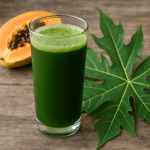Omega-3 fatty acids are vital for our overall health and well-being. While fish and seafood are commonly known as excellent sources of omega-3, there is a lesser-known realm of vegetables that offer a sustainable and nutritious alternative. In this article, we will explore the world of vegetables and unveil some of the most prominent sources of omega-3 that can easily be incorporated into our daily diets.
Discover the benefits of these vegetables with highest source of omega-3 and how they contribute to optimal health.
Omega-3 Rich Vegetables:
1. Flaxseeds
Flaxseeds, also known as linseeds, are tiny seeds that pack a nutritional punch, particularly in terms of omega-3 fatty acids. They contain alpha-linolenic acid (ALA), a plant-based form of omega-3. Flaxseeds can be consumed whole or ground, making them versatile and easy to incorporate into various recipes.
Adding a tablespoon of ground flaxseeds to your smoothies, cereals, or baked goods is a simple way to boost your omega-3 intake. Flaxseeds are not only rich in ALA but also provide dietary fiber and lignans, which have antioxidant properties and potential health benefits. Regular consumption of flaxseeds has been associated with reduced inflammation, improved heart health, and enhanced brain function.
RELATED: Unlocking the 6 Health Benefits of Flaxseeds and It’s Nutritional Value
2. Chia Seeds

Chia seeds have gained popularity in recent years due to their impressive nutritional profile, including their omega-3 content. These small seeds are packed with ALA, making them an excellent vegetarian source of this essential fatty acid.
Chia seeds can be soaked in water to form a gel-like consistency, making them a versatile addition to recipes. Sprinkle chia seeds over yogurt, salads, or puddings to enhance your omega-3 intake. These seeds not only provide omega-3 but also offer dietary fiber, protein, and antioxidants. They have been associated with various health benefits, such as promoting satiety, stabilizing blood sugar levels, and supporting digestive health.
3. Hemp Seeds
Hemp seeds have emerged as a nutritional powerhouse, offering a well-rounded profile that includes omega-3 fatty acids. These small seeds are a valuable plant-based option for meeting your omega-3 needs.
Hemp seeds contain ALA, making them an excellent addition to your diet. They have a delicate, nutty flavor and can be sprinkled on salads, added to smoothies, or incorporated into baked goods. In addition to omega-3, hemp seeds are rich in protein, providing all nine essential amino acids, as well as essential minerals like magnesium and zinc. They also contain gamma-linolenic acid (GLA), which may possess anti-inflammatory properties and support hormonal balance.
4. Brussels Sprouts
Brussels sprouts, with their unique appearance, are not only visually appealing but also a fantastic source of essential nutrients, including omega-3 fatty acids. While they may not be as high in omega-3 as some other sources on this list, they still provide a noteworthy contribution.
Incorporating Brussels sprouts into your meals can help increase your overall omega-3 intake while delivering fiber, vitamin C, vitamin K, and antioxidants. These cruciferous vegetables can be prepared in various ways, such as roasting, sautéing, steaming, or adding them to stir-fries. They provide a delicious way to boost your nutrient intake and add variety to your diet.
Why Include These Omega-3 Rich Vegetables To Your Diet?
Omega-3 fatty acids play a crucial role in maintaining optimal health and functioning in the human body. Here are some key ways in which omega-3 affects our body:

- Heart Health: Omega-3 fatty acids have been extensively studied for their beneficial effects on cardiovascular health. They help reduce triglyceride levels, decrease blood pressure, prevent the formation of blood clots, and reduce inflammation. These actions collectively contribute to a lower risk of heart disease, heart attacks, and strokes.
- Brain Function and Mental Health: Omega-3 fatty acids are vital for brain development and function. They are integral components of cell membranes in the brain and help maintain the integrity and fluidity of these membranes. Research suggests that omega-3s, especially docosahexaenoic acid (DHA), play a role in cognitive function, memory, and learning. Adequate omega-3 intake has also been associated with a reduced risk of age-related cognitive decline and neurodegenerative diseases such as Alzheimer’s disease. Additionally, omega-3s have shown promise in managing and preventing mood disorders such as depression and anxiety.
- Inflammation and Immune Response: Omega-3 fatty acids possess anti-inflammatory properties. They help regulate the body’s immune response, reducing the production of pro-inflammatory molecules. This anti-inflammatory effect can be beneficial in managing chronic inflammatory conditions such as rheumatoid arthritis, inflammatory bowel disease, and asthma.
- Eye Health: DHA, an omega-3 fatty acid, is a major component of the retina in the eye. It plays a crucial role in visual development and maintenance of eye health throughout life. Adequate intake of omega-3s has been associated with a reduced risk of age-related macular degeneration, a leading cause of vision loss in older adults.
- Pregnancy and Early Development: Omega-3 fatty acids, particularly DHA, are essential for the development of the fetal brain and eyes during pregnancy. Maternal omega-3 intake supports the healthy development of the baby’s nervous system. It is recommended that pregnant and breastfeeding women consume sufficient omega-3s to support the optimal growth and development of their child.
- Skin Health: Omega-3 fatty acids contribute to maintaining healthy skin. They help retain moisture, promote skin elasticity, and reduce inflammation. Omega-3s may be beneficial in managing skin conditions such as eczema, psoriasis, and acne.

It is important to note that omega-3 fatty acids are essential nutrients, meaning our bodies cannot produce them and must obtain them through diet or supplementation.
Including omega-3-rich foods or supplements in our daily routine can help ensure an adequate intake of these beneficial fatty acids and support overall health and well-being.
However, it is always advisable to consult with a healthcare professional before starting any new supplementation or making significant dietary changes.
The Bottom Line
Expanding our knowledge of omega-3 sources to include vegetables opens up a world of possibilities for individuals following a plant-based or vegetarian lifestyle. By incorporating omega-3-rich vegetables like flaxseeds, chia seeds, hemp seeds, and Brussels sprouts into our meals, we can harness the power of these nutritious sources to support our overall health and well-being.
Embracing these vegetable powerhouses allows us to enjoy the benefits of omega-3 fatty acids while promoting sustainability and exploring the culinary delights of plant-based nutrition.
Disclaimer: This is for informational purposes only.
Did you find this helpful? Let us know in the comments.
You can also visit our Facebook and YouTube pages to know more about plants and their health benefits.
You might also like:
- Unlocking the 6 Health Benefits of Flaxseeds and It’s Nutritional Value
- 10 Amazing Super Seeds for a Healthy Lifestyle
- Foods That Will Help Prevent Heart Attack and Unclog Arteries
- 5 Remarkable Benefits of Avocados For Gut Health
- Quality Sleep: Reducing Stress and Unlocking Other Remarkable Benefits








